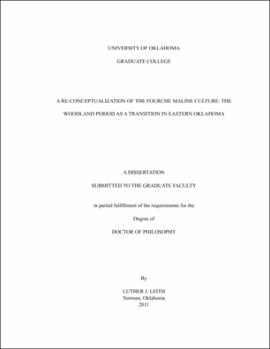| dc.contributor.advisor | Wyckoff, Don G | |
| dc.creator | Leith, Luther James | |
| dc.date.accessioned | 2019-04-27T21:33:24Z | |
| dc.date.available | 2019-04-27T21:33:24Z | |
| dc.date.issued | 2011 | |
| dc.identifier | 99296564902042 | |
| dc.identifier.uri | https://hdl.handle.net/11244/318998 | |
| dc.description.abstract | The question: "What is Fourche Maline?" has been long debated in Oklahoma. It is argued here that use of a transegalitarian framework is useful in addressing this question. It is proposed that Fourche Maline culture represents transegalitarian complex hunter-gatherer-horticulturalists on the prairie/woodland boarder of eastern Oklahoma. To address this hypothesis the social organization, subsistence, bioarchaeology, settlement patterns, and evidence for territoriality are examined. This research also revises the chronology for the Woodland Period in eastern Oklahoma, and brings Oklahoma terminology into line with the surrounding states. Based on laboratory analysis of existing W.P.A. (Works Progress Administration) collections, more recent collections, and fieldwork (including geophysical remote sensing) indicate that Fourche Maline people are transegalitarian hunter-gatherer-horticulturalists. | |
| dc.format.extent | 230 pages | |
| dc.format.medium | application.pdf | |
| dc.language | en_US | |
| dc.relation.requires | Adobe Acrobat Reader | |
| dc.subject | Haskell County (Okla.)--Antiquities | |
| dc.subject | Le Flore County (Okla.)--Antiquities | |
| dc.subject | Latimer County (Okla.)--Antiquities | |
| dc.subject | Woodland culture--Oklahoma--Haskell County | |
| dc.subject | Woodland culture--Oklahoma--Le Flore County | |
| dc.subject | Woodland culture--Oklahoma--Latimer County | |
| dc.title | A Re-Conceptualization of the Fourche Maline Culture: The Woodland Period as a Transition in Eastern Oklahoma | |
| dc.type | text | |
| dc.type | document | |
| dc.thesis.degree | Ph.D. | |
| ou.group | College of Arts and Sciences::Department of Anthropology | |
